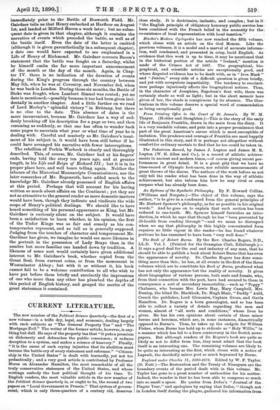CURRENT LITERATURE.
The new number of the Political Science Quarterly—the first of a new volume—is a trifle dry, legal, and economic, dealing largely with such subjects as "The General Property Tax" and "The Mortgage Evil." The writer of the former article, however, is any- thing but dull. He says of the property tax that "it puts a premium on dishonesty and debauches the public conscience; it reduces deception to a system, and makes a science of knavery." Finally, "it is the cause of such crying injustice that its abolition must become the battle-cry of every statesman and reformer." "Citizen- ship in the United States" is dealt with learnedly, yet not too pedantically ;. and a very good article is contributed by Professor Morse on Alexander Hamilton, the most remarkable of all the truly conservative statesmen of the United States, and whose writings embody the best political thought of his time. To English -readers, the most valuable article in the new number of the Political Science Quarterly is, or ought to be, the second of two papers on "Local Government in Prussia." That system of govern- ment, which is only three-quarters of a century old, deserves close study. It is doctrinaire, inelastic, and complex; but in it "the English principle of obligatory honorary public service has been combined with the French belief in the necessity for the , -co-existence of local representation with local taxation."
Blackie's Modern Cyclopedia has now reached the fifth volume, which closes with an article on the God Ilomus. Like the previous volumes, it is a model and a marvel of accurate informa- tion, well condensed, and presented in crisp, lucid English. As evidence that this work is up to time, it may be mentioned that in the historical portion of the article "Ireland," mention is made of the Crimes Act of 1887. The geographical, bio- graphical, and scientific articles are exceptionally good, and where disputed evidence has to be dealt with, as in "Iron Mask" and "Junius," every side of a difficult question is given briefly, and yet with scrupulous impartiality. The tendency to succinct- ness perhaps injuriously affects the biographical notices. Thus, in the character of Josephine, Napoleon's first wife, there was certainly shade as well as light ; but in the short memoir here given of her, the shade is conspicuous by its absence. The illus- trations in this volume deserve a special word of commendation as being exceptionally good.


































 Previous page
Previous page